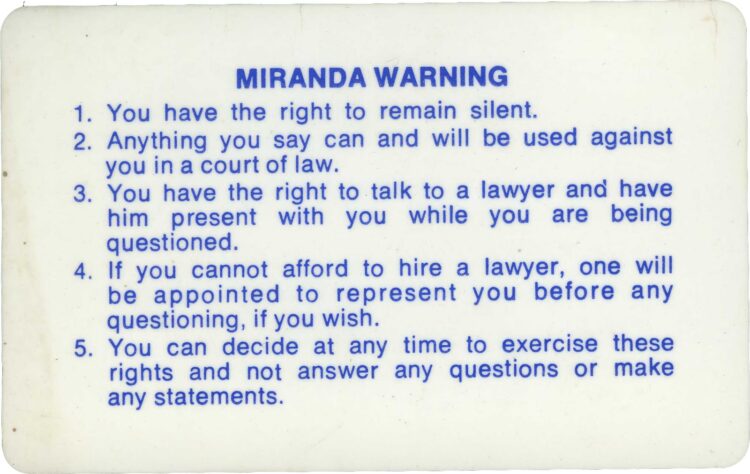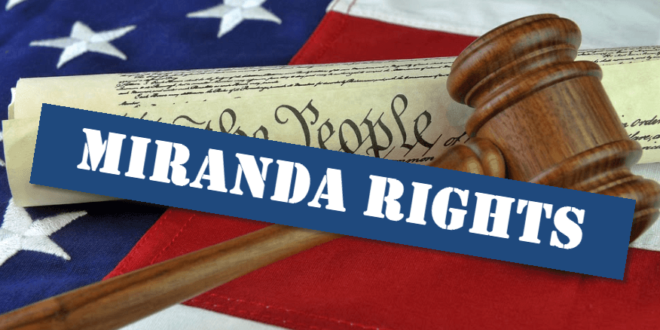In a memorable scene from the 2012 film “21 Jump Street,” Officer Greg Jenko, who is played by Channing Tatum, is told that two drug dealers he apprehended were released because they were not given a Miranda warning. You may not know about this film, but you surely have heard about this in other films or TV shows.
Films and television shows, often refer to Miranda rights, but this is somewhat misleading as the rights the Miranda warning refers to are actually provided by the Fifth and Sixth Amendments to the U.S. Constitution.
If you know about what we are talking about, but you don’t know why is it called the Miranda warning, here is why.
The Miranda warning is named after a man who took legal action against the state of Arizona in 1966. Ernesto Miranda was convicted of kidnapping and rape charges largely based on a confession he made after an interrogation lasting two hours. He appealed the decision because he was not informed that he was entitled to speak with an attorney before the questioning began or warned that what he said to detectives could be used against him in court. The U.S. Supreme Court decided to hear the case after the Arizona Supreme Court upheld the conviction. In a landmark ruling, the nation’s highest court overturned the conviction and established that criminal suspects must be made aware of certain rights before they can be questioned. The wording of the Miranda warning used by law enforcement agencies across the United States today is based on what Chief Justice Earl Warren wrote about Miranda v. Arizona in 1966.
There aren’t any exceptions to this rule, and if any law enforcement official declined to offer a Miranda warning to an individual in their custody, they still may interrogate the person and act upon the knowledge gained, but they may not use that person’s statements as evidence against them in a future criminal trial.
Elements of the Miranda Warning

While police departments are free to decide how to word Miranda warnings, the U.S. Supreme Court ruling requires the language used to meet certain guidelines. Before you can learn more about the rest of the laws, read these pointers first:
- Suspects must be told that they have the right to remain silent.
- Suspects must be told that any statements they choose to make could be used against them.
- Suspects must be told that they have the right to consult with an attorney and have their attorney present during questioning.
- Suspects who cannot afford to hire an attorney must be told that an attorney can be provided for them
The Fifth and Sixth Amendments

The Miranda warning is designed to ensure that criminal suspects know about rights provided by the U.S. Constitution. The Fifth Amendment states that no person can be compelled to be a witness against themselves, and the Sixth Amendment states that all people facing legal proceedings have the right to counsel. It is important to bear in mind that these rights are enjoyed by all people in the United States and not just U.S. citizens. This means that police must give a Miranda warning when anybody is taken into custody, which includes documented immigrants, undocumented immigrants, and tourists. Because it is a part of a preventive criminal procedure rule that law enforcement is required to administer to protect an individual who is in custody and is subject to direct questioning. Or its functional equivalent from a violation of their Fifth Amendment right against compelled self-incrimination.
According to the Fifth and Sixth Amendments you’ve always had this right, but dating from the sixties there is a specific name to it.
Protecting the Innocent

Many people assume that judges, juries and prosecutors are tasked with identifying guilt and determining the appropriate punishment, but the criminal justice system is designed primarily to protect the innocent. The overriding principle is that it is better for a hundred guilty people to go free than for one innocent person to go to prison, which is why criminal defendants are presumed innocent and prosecutors must prove their cases beyond a reasonable doubt. This principle is also the reason why those accused of committing crimes are entitled to a defense attorney and make their arguments before a jury of their peers. Attorneys with experience in civil or criminal matters could help those who wish to learn more about legal protections in the United States.
The U.S. Supreme Court decision in Miranda v. Arizona lets the police know that the protections provided by the U.S. Constitution are just as important in an interrogation room as they are in a court of law. Television and film audiences are reminded of this every time a fictional police officer reads a suspect their rights. You certainly know it by now, and you could say the rights by yourself: “You have the right to remain silent. Anything you say can be used against you in court. You have the right to talk to a lawyer for advice before we ask you any questions. You have the right to have a lawyer with you during questioning. If you cannot afford a lawyer, one will be appointed for you before any questioning if you wish. If you decide to answer questions now without a lawyer present, you have the right to stop answering at any time.”
So if you ever get yourself arrested, or encountered with the police it is of great importance for you to know your rights. There are obligations for every person that is on the U.S. soil, and every citizen of the United States of America, but also important rights that need to be respected.
It is also important to know your rights in any sphere and field of your life because the rights you have as a human being and as a citizen of the United States of America exist to make your life easier and more pleasant.
 Hi Boox Popular Magazine 2024
Hi Boox Popular Magazine 2024



